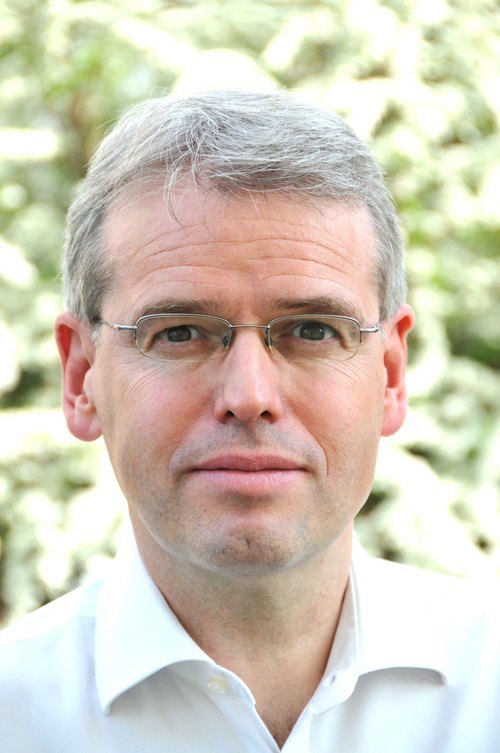Holger Schmidt: "I sometimes wonder if people spend as much time on Facebook as they used to."Holger Schmidt: „Manchmal frage ich mich allerdings, ob die Menschen dauerhaft soviel Zeit auf Facebook verbringen wie bisher"
Janina Benz: Hi Holger – could you briefly introduce yourself to our readers?
Holger Schmidt: Of course. After 14 years as a journalist for the German newspaper Frankfurter Allgemeine Zeitung, I joined the news magazine Focus at the start of the year and will be writing for them about the digital economy. When I’m not working, I enjoy spending time with my family and going mountain biking.
JB: You’re one of Germany’s best-known online journalists. What do you think the future holds for journalism – will it be predominantly driven by the print or online market?
HS: Print and online journalism will coexist for a long time to come. As a journalist, it makes sense for me to be active both in print and online to reach as many readers as possible. So while my column on the digital economy is appearing in the print edition of Focus, I’m also launching a blog soon on the Focus website, focus.de.
JB: You’re also very active on Twitter. What are the differences between the way you use Facebook and Twitter?
HS: Twitter is my preferred news source and I use it intensely, to share news as well as consume it. I use Facebook more for entertainment and communication, less for information. If I had to divide up my social media time, I’d say about 70% is spent on Twitter, 15% on Facebook and 15% on Google+.
JB: We’ve been making good use of social media to publicize the CODE_n contest. In turn, this has allowed us to attract well-known interviewees and jury members. During the campaign, we also saw very clearly that Twitter and Facebook have very different strengths and possibilities. What do you think the strengths of these two networks are?
HS: Twitter’s clear strength is its ability to spread news rapidly. It plays a more important role in many other countries than in Germany, and is less suited to communication than Facebook is. I sometimes wonder if people spend as much time on Facebook as they used to.
JB: How come Twitter is mostly only popular among internet professionals in Germany?
HS: Twitter’s great for news junkies, but the entry barrier is too high for most people to use it as a practical information channel. If you don’t mind reading the news with a slightly delay, you don’t need Twitter. I think news aggregators will definitely help in extracting the most important information from the 250 million tweets sent every day. Twitter also wants to open an office in Germany to gain a foothold here.
JB: How do you think Facebook and Twitter will continue to develop?
HS: Facebook will hit the limits of its growth in the foreseeable future, so it will have to focus more on making money. Twitter will likely undergo fairly major change to make itself attractive to more people. But I see both as established, central parts of the web infrastructure.
JB: What does the future hold for Google+?
HS: Google+ has made a good start, but I’m not sure what role it’s supposed to play next to Facebook and Twitter. However, integrating content from Google+ into Google search results will serve to populate Google+ almost automatically.
JB: Managing trust is a hot topic in the media at the moment due to its choice as the theme for this year’s CeBIT, and also in light of other issues, such as the current debate about the enforced introduction of the Facebook Timeline. How do you see this discussion? Where do you think privacy is most threatened?
HS: Anyone using social networking sites needs to understand that their advertising models are based on user data. I’m neither surprised nor appalled that Facebook shows me advertising tailored as closely as possible to my stated interests – it’s a sensible business model for a social network. What I do have concerns about is what happens outside Facebook via Facebook Connect, which records which websites I visit. It’s none of their business. Apart from that though, I keep to one basic rule: Everything I post on social networking sites can be read by anyone – today and in ten years’ time.
JB: Thank you for the interview.
HS: My pleasure. All the best!
Janina Benz: Hallo Holger könntest du dich unseren Lesern kurz vorstellen?
Holger Schmidt: Gerne. Nach 14 Jahren bei der FAZ schreibe ich seit Jahresanfang für den FOCUS über die digitale Wirtschaft. Ansonsten kümmere ich mich bevorzugt um meine Familie und fahre gerne Mountainbike.
JB: Du bist einer der bekanntesten Journalisten im Web. Wie sieht deiner Meinung nach die Pressearbeit der Zukunft aus, ist sie print- oder onlinegetrieben?
HS: Print und Internet werden sicher noch lange Zeit parallel nebeneinander bestehen. Als Journalist finde ich es sinnvoll, im Print- und im Onlinemarkt tätig zu sein, um möglichst viele Leser zu erreichen. Deshalb gibt es die “Web-Wirtschaft” im gedruckten FOCUS und bald auch mein Blog auf FOCUS.de.
JB: Du selbst bist ja nicht nur bekannt, sondern auch sehr aktiv in der Twittersphäre. Wie differenziert nutzt du Facebook und Twitter?
HS: Twitter ist mein bevorzugter Nachrichtenticker, den ich intensiv nutze – auch für die Verbreitung von Nachrichten. Facebook nutze ich eher für Unterhaltung und Kommunikation, weniger für die Information. Wenn ich meine Social-Media-Zeit aufteilen müsste, entfielen etwa 70 Prozent auf Twitter, 15 Prozent auf Facebook und 15 Prozent auf Google+.
JB: Wir haben erfolgreich auf Social Media-Kommunikation gesetzt, um den CODE_n Contest bekannt zu machen. So konnten wir z.B. hochkarätigen Interviewpartner oder Jury-Mitgliedern gewinnen. Die Kampagne hat uns aber auch sehr deutlich vor Augen geführt, das Twitter und Facebook ganz unterschiedliche Stärken und Möglichkeiten bieten. Wo siehst du die Vorteile bzw. die Stärken der beiden Netzwerke?
HS: Die Stärke von Twitter ist ganz klar die schnelle Nachrichtenverbreitung. In vielen Ländern spielt Twitter dabei eine wichtigere Rolle als in Deutschland. Für die Kommunikation ist Twitter weniger geeignet als Facebook. Manchmal frage ich mich allerdings, ob die Menschen dauerhaft soviel Zeit auf Facebook verbringen wie bisher.
JB: Wie kommt es, dass Twitter in Deutschland meistens nur unter den „Berufs-Onlinern“ beliebt ist?
HS: Für Nachrichtenjunkies ist Twitter genial, aber für den Großteil der Menschen ist die Einstiegshürde, um Twitter als sinnvollen Informationskanal nutzen zu können, zu hoch. Wer seine Nachrichten auch mit etwas zeitlicher Verzögerung lesen mag, braucht Twitter nicht. Ich denke, dass Nachrichtenaggregatoren helfen werden, aus den 250 Millionen Tweets am Tag die wertvollen Infos herauszufiltern. Zudem will Twitter in Deutschland ein Büro eröffnen, um hier Fuß zu fassen.
JB: Wie schätzt du die zukünftige Entwicklung der beiden Netzwerke ein?
HS: Facebook wird in absehbarer Zeit an seine Wachstumsgrenze stoßen und muss jetzt zusehen, mehr Geld zu verdienen. Twitter wird wohl noch einen größeren Wandel durchmachen, um für mehr Menschen attraktiv zu werden. Beide Netzwerke sehe ich als zentrale Web-Infrastruktur aber gesetzt.
JB: Wie wird sich Google+ entwickeln?
HS: Google+ ist auf einem guten Weg, aber die Rolle neben Facebook und Twitter ist mir noch nicht ganz klar. Der Hebel, dass Google+ in die Google-Suchmaschine einfließt, wird das Google-Netzwerk aber quasi automatisch bevölkern.
JB: Nicht nur die aktuelle Diskussion um die obligatorische Einführung der Facebook Chronik, sondern auch die Ernennung zum Leitthema der bevorstehenden CeBIT 2012 haben das Thema „Managing Trust“ in den Fokus der Medien gerückt. Wie siehst du die aktuelle Diskussion? Wo ist die Privatsphäre am meisten gefährdet?
HS: Wer in den sozialen Medien unterwegs ist, sollte sich bewusst sein, dass die Werbemodelle eben auf den Daten der Nutzer aufbauen. Dass Facebook mir Werbung zeigt, die möglichst genau auf meine zuvor geäußerten Interessen abgestimmt ist, finde ich weder überraschend noch verwerflich, sondern ein sinnvolles Geschäftsmodell für ein soziales Netzwerk. Bauchschmerzen habe ich vor allem mit den Dingen, die per Facebook Connect außerhalb der Seite passieren. Dass Facebook zum Beispiel mitbekommt, welche Websites ich sonst noch besuche. Das geht Facebook nichts an. Ansonsten halte ich mich an den Grundsatz: Alles, was ich in den sozialen Medien poste, darf von allen gelesen werden – heute und auch noch in zehn Jahren.
JB: Vielen Dank für das nette Interview
HS: Gerne, viele Grüße.






Write a comment